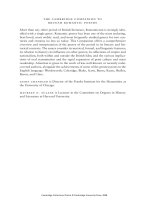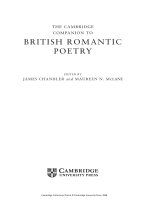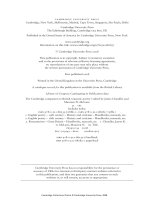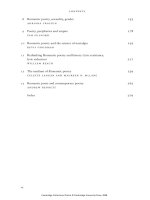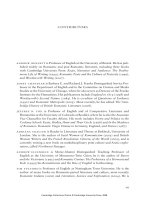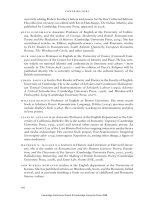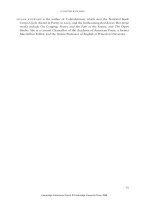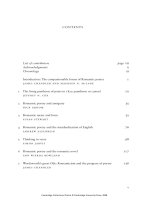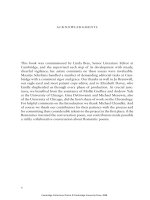The cambridge companion to british roman 256
Bạn đang xem bản rút gọn của tài liệu. Xem và tải ngay bản đầy đủ của tài liệu tại đây (38.09 KB, 1 trang )
w i l l i a m k e ac h
the power of Apollo’s music is most overwhelming – “A voice came sweeter,
sweeter than all tune” (Book II, l. 292). The passage enacts the power of lyric
to arrest historical consciousness within an allegorical unfolding of poetry’s
own crisis of historical change.
Focusing as I have done on individual moments of lyric intensity in The
Prelude and Hyperion may seem to disregard, even falsify, the more pervasive
lyric textures of narration in these poems. But there are advantages to paying
especially close attention to the effects such performative thematizations of
lyric have on these poems’ epic ambitions and trajectories. With Shelley’s
Prometheus Unbound, the last of the grand Romantic undertakings I offer
for fresh consideration from this perspective, we are faced with a still more
challenging deployment of lyric. As an experiment in “Lyrical Drama” (the
designation in Shelley’s subtitle) motivated by a radical utopian politics and
by a radically idealist set of philosophical convictions, Prometheus Unbound
pervasively subordinates to lyric form not only narrative but the fiction of
dramatic voice itself. It could be argued that Shelley’s Prometheus is one
continuous exploration of lyric’s potential to resist the history of things as
they are and of society as it is, and that it accomplishes this resistance as
remarkably through its “lyric formalism” (Kaufman’s Adornian term) as
through its explicit political vision.
Within this sustained lyric register are textual utterances identified exclusively as lyric functions – “Chorus” and “Semichorus,” “Voice” and “Echo.”
Shelley’s experimenting with these lyric fictions presents important opportunities for reading in terms of a paradigm of resistance/seduction. Consider
the sequence that emerges out of Panthea’s astonishing exchange with Asia
about her prophetic dreams in Act II, scene 1. They eventually envision being
able to “read” – on the blossoms shed from a “lightning-blasted almond tree”
and in “the shadows of the morning clouds” – variations on the words “O
follow, follow.” First written and read, then spoken and heard, these words
will eventually lead Asia and Panthea to Demogorgon’s realm of necessity.
But the inscribed words must first be re-articulated as natural echo and
song.
ECHOES
O follow, follow,
As our voice recedeth
Through the caverns hollow
Where the forest spreadeth;
[More distant.]
O follow, follow,
Through the caverns hollow,
As the song floats, thou pursue
234
Cambridge Collections Online © Cambridge University Press, 2008
